Past Screenings and Events 2021
Stitching Palestine
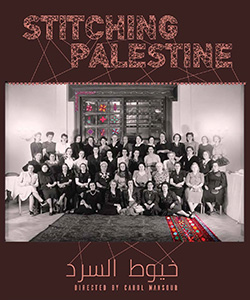
In recogniton of International Women's Day we will be screening online the critically acclaimed film "Stitching Palestine". The screening will be followed with a panel discussion.
Saturday March 6, 12:30 pm EST
You must register in advance to join the online screening of Stitching Palestine.
About Stitching Palestine
Directed Carol Mansour | Produced by Muna Khalidi | Documentary | 78 min. | 2017 - Lebanon, Jordan, Palestine
Twelve Palestinian women sit before us and talk of their life before the Diaspora, of their memories, of their lives and of their identity. Their narratives are connected by the enduring thread of the ancient art of embroidery.
Twelve resilient, determined and articulate women from disparate walks of life: lawyers, artists, housewives, activists, architects, and politicians stitch together the story of their homeland, of their dispossession, and of their unwavering determination that justice will prevail.
Through their stories, the individual weaves into the collective, yet remaining distinctly personal.
Twelve women, twelve life-spans and stories from Palestine; a land whose position was fixed on the map of the world, but is now embroidered on its face.
About the Panel
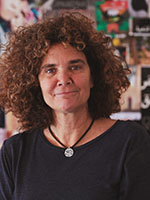
Carol Mansour
Carol Mansour is an independent documentary film maker. She founded Forward Film Production in 2000 in Beirut, Lebanon. With over 25 years in documentary production, Mansour achieved international recognition and honor for her films, with over fifty film festival screenings and official selections worldwide.
Her films have been screened at several festivals in Europe and North America, winning numerous prestigious awards including most recently, the Best Documentary Award at the Delhi International Film Festival in 2018 and the Audience Award for Best Feature Film at the Boston Palestine Film Festival, 2017, for her 2017 film “Stitching Palestine”. She was awarded the Best Documentary Award at the Al-Ard Film Festival in Sardegna, and the Women Film Critics Circle Award at Rated SR Festival 2015 in New York, for her 2014 documentary film “We cannot go there now, my Dear”. She was awarded Best Documentary at the Rated SR Festival 2014 in New York, and the Jury’s Special Mention at the FIFOG festival in Geneva for her 2013 film "Not Who We Are". Her 2006 film “A Summer Not To Forget” received Best Short International Documentary at the New Zealand Festival. She has also won the Jury’s Prize at the Institute du Monde Arab in Paris and Best Documentary at the Arab Film Festival in Rotterdam.
Carol’s work reflects her concern for human rights and social justice, covering issues such as migrant workers, refugees, environmental issues, mental health, rights of the disabled, war and memory, right to health, and child labor. Carol is Lebanese of Palestinian origin. She studied in Montreal, Canada, and is currently living and working from Beirut, Lebanon.
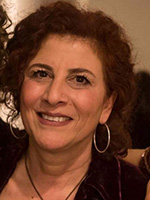
Muna Khalidi
With a Ph.D. in health policy and planning, and with 30 years’ experience working in the social and health development fields in Lebanon and the Arab region, Muna has been working with various international and local organizations providing technical assistance for them to develop strategic plans and to design and develop programs. In 2012 she began collaborating with Carol Mansour on the research and production of documentary films dealing with issues of social justice and human rights, bringing her experience in the academic, public, private, and NGO sectors into the film and documentary-making field.
So far, she has worked closely with Carol Mansour on numerous short films and awareness raising campaigns and programs as well as on the production of nine feature-length documentary films: on mental health in Lebanon, the memory of the Lebanese civil war among the new generation, the plight of Syrian refugee women, the Palestinian refugees from Syria, Palestinian women’s stories and memories of dispossession, the psychological impact of being a refugee on Syrian men, the challenges facing persons living with Down Syndrome, prostitution in Lebanon, and the realities of domestic workers.
Muna is on the Board of Directors of three national Lebanese NGOs implementing social development, mental health care and hospice care programs within both the Lebanese, as well as the Palestinian refugee communities in Lebanon.
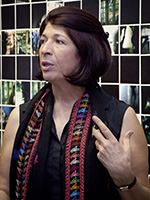
Rehab Nazzal
Rehab Nazzal is a Palestinian-born multidisciplinary artist and educator based in Toronto, Canada. Her photography, video, and sound works deal with the effect of settler colonial violence on the bodies and minds of colonized peoples, and on the land, trees, and other non-human life in colonized territories. Nazzal's work has been exhibited in Canada, Palestine, and internationally in both group and solo exhibitions. She holds a PhD in Art and Visual Culture from Western University in London, ON, an MFA from Ryerson University in Toronto, a BFA from the University of Ottawa. She has received numerous awards including the Social Sciences and Humanities Research Council of Canada doctoral award.
The Village Under the Forest
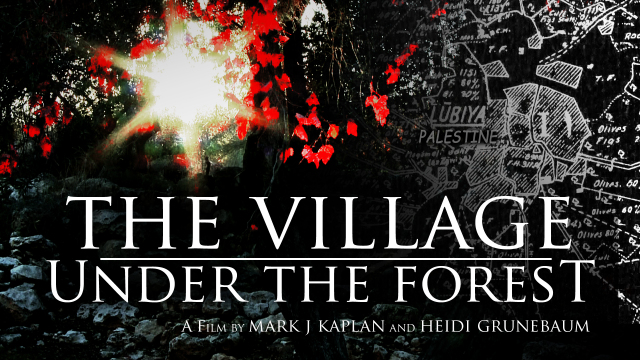
Hamilton Voices of Palestine Film Series is pleased to be partnering with:
Independent Jewish Voice's (IJV) Online Chavurah;
Jewish Liberation Theology Institute;
Internation Jewish Anti-Zionist Network (IJAN);
Stop the JNF Campaign
to present our first online screening on Sunday, January 24th at 1 pm EST.
We will be screening "The Village Under the Forest" (Grey Matter Media, 2013), a feature-length documentary by Heidi Grunebaum and Mark Kaplan.
The film screening will be followed by a discussion with filmmaker Heidi Grunebaum and special guest Eitan Bronstein Arpicio, founder of Zochrot and co-founder of De-Colonizer.
Please register in advance for the film screening.
About The Village Under the Forest
Directed and produced by Mark Kaplan | Written and narrated by Heidi Grunebaum | Documentary | 67 min. | 2013 - South Africa/Palestine/Israel
Unfolding as a personal meditation from the Jewish diaspora, The Village Under the Forest explores the hidden remains of the destroyed Palestinian village of Lubya, which lies under a purposefully cultivated forest plantation called South Africa Forest.
Using the forest and the village ruins as metaphors, the documentary explores themes related to the erasure of the Palestinian Nakba (catastrophe) and the persistence of memory. Through a multi-layered visual, aural and narrative assemblage, the film asks that we imagine a shared future as an ethical obligation in which dignity, acknowledgement, return and co-habitation may be possible in Israel/Palestine.
The Village Under the Forest won the 2013 Encounters South African International Documentary Festival audience award for best South African documentary of 2013. Its world premier at the festival (6-16 June) was covered widely in national electronic media and film industry publications, as well as in reviews and interviews with the filmmakers.The film also attracted international reviews and coverage.
In 2013 The Village under the Forest screened to sold-out audiences at the Tri Continental Human Rights Film Festival in South Africa (13-29 September), at independent cinemas, the Labia (Cape Town), The Nielsie (Stellenbosch), The Bioscope (Johannesburg), and Spiga D’Oro (Durban), as well as at the District 6 Museum (Cape Town). Screenings were followed by lively discussions in audience Q & As with the filmmakers. In January 2014, the film was screened at UCT’s Summer School as part of an offering on contemporary issues in the Middle East.
The Village Under the Forest was also selected for the Boston Palestine Festival held at the Museum of Fine Arts in Boston, USA, and was an official selection for the competition section of the ‘Al Ard’ Film Festival, Sardinia, Italy. In November, Arabic and Hebrew subtitled versions of the film were screened at the first ever film festival on the Palestinian Nakba in Israel, organized by Zochrot, and screened at the Tel Aviv Cinemateque. In 2014 the film was screened at festivals and events in Europe, North America, Africa and the Middle East.
Please join us. Register in advance.
Event schedule:
1:00 am EST / 10:00 pm PST / 6:00 pm GMT / 8:00 pm CAT - Welcome
1:15 pm EST / 10:15 am PST / 6:15 pm GMT / 8:15 pm CAT - Film Screening
2:15 pm EST / 11:15 am PST / 7:15 pm GMT / 9:15 pm CAT - What can we do?
2:30 pm EST / 11:30 am PST / 7:30 pm GMT / 9:30 pm CAT - Q & A - with Heidi Grunebaum
3:15 pm EST / 12:15 pm PST / 8:15 pm GMT / 10:15 pm CAT - Closing
This film screening/film discussion is co-presented by the Hamilton Voices of Palestine Film Series, the IJV #StopJNFCanada campaign, the International Jewish Anti-Zionist Network Canada, and the Jewish Liberation Theology Institute.
You must register in advance for this meeting.
After registering, you will receive a confirmation email containing information about joining the meeting.
Underwriters, Endorsers, Sponsors, Partners and Community Friends:
Beit Zatoun; The Canadian Palestinian Social Association in London Ontario, Canada; Canadians for Justice and Peace in the Middle East, Hamilton; Hamilton Coalition to Stop the War; Jewish Liberation Theology Institute; Independent Jewish Voices (IJV) - Hamilton; People for Peace, London